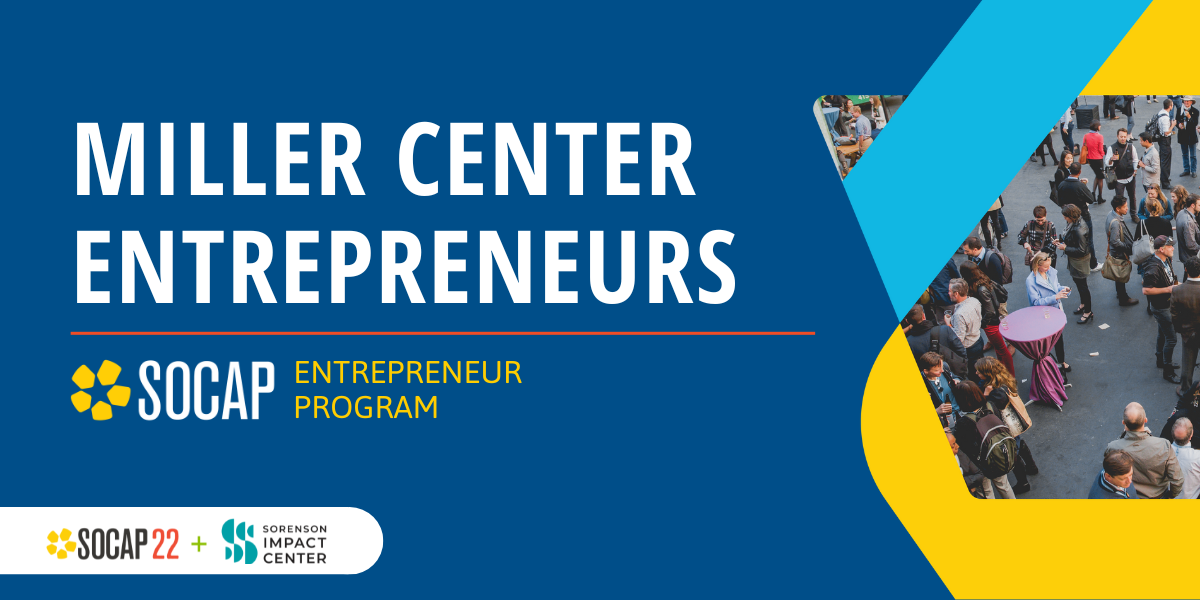As part of SOCAP’s commitment to supporting social entrepreneurship, we look for partners every year to join our SOCAP Entrepreneur cohort. The Miller Center for Social Entrepreneurship at Santa Clara University has been one of SOCAP’s longest-standing partners by providing a pipeline of entrepreneurs and collaborating with other accelerator programs at our in-person event. The Miller Center focuses on social entrepreneurs working to end global poverty and protect the planet.
Below we introduce the Miller Center Entrepreneurs who will join us at SOCAP22 and pitch on stage from 11:30 a.m. to 12:30 p.m. Wednesday, October 19, in the YBCA Screening Room. In line with the Miller Center’s goal of focusing efforts on social entrepreneurs with the highest potential, this sector-focused cohort is composed of Miller Center alumni entrepreneurs working on water and climate-smart agriculture solutions.
Sustainable Agriculture
AMAATI
AMAATI is pioneering the revival of the fonio grain in northern Ghana. The social enterprise was formed to help create sustainable livelihoods for women farmers and establish regenerative land management systems. By empowering and supporting rural female farmers with skills training and income generation, AMAATI provides a path out of poverty and inequality.
Cycle Connect
The Cycle Connect team believes that every person should have access to the necessary tools to thrive. They work to help farming families in Uganda who lack access to basic agricultural tools because of distance and cost. Cycle Connect is combining income-generating tools, inclusive financing, and training to increase access to economic opportunity for these farmers.
East Africa Fruits
East Africa Fruits aggregates demand and delivers a wide range of fresh and exotic produce directly from farms to stores of B2B customers: retailers, wholesalers, local vendors, restaurants and cafés, hotels, and exporters. They support smallholder farmers on crop planning in alignment with marketplaces, upgrading farm-side infrastructure in the transition to sustainable practices.
Good Nature Agro
Founded in 2014, Good Nature is a for-profit social enterprise that believes in farmer-centric impact. They work with Africa’s most rural small-scale farmers to supply the region with high-quality legume seed and commodities and help them move out of poverty. Through human-centered design, they co-created a model that answers farmers’ most pressing questions.
Miyonga Fresh Greens
Founded in 2015 as a family business, Miyonga began as a transitional horticultural farm with 10 acres in Kenya. They now are exporters with access to a network of more than 10,000 growers across East Africa. Their fresh fruits and vegetables are exported to the UK, Norway, Netherlands, Germany, Greece, Ireland, and South Africa.
Warc Africa
Warc operates in West Africa, with established agricultural production and consulting operations in Sierra Leone and Ghana. Its three farms have a combined cultivated area of 5,000 acres. Its training farm in Ghana serves more than 600 smallholder farmers, and its main operations farm in Sierra Leone employs more than 100 farmers who grow rice and maize.
WASH (Water, Sanitation, and Hygiene)
BushProof
BushProof is an award-winning enterprise started by emergency aid and development professionals. They specialize mainly in groundwater services and products, including water well drilling and custom water supply technologies for remote areas. Based and registered in Madagascar, they have a long history of working with the local private sector as well as local and international NGOs.
Cleanergy Tech Solutions
Cleanergy Tech Solutions provides sustainable organic waste management solutions designed to help people utilize waste as a commodity. Their indigenous modular biogas technology, Swachhgas, provides excellent economic returns to urban as well as rural establishments.
Gravity Water
Gravity Water turns rain into safe drinking water at schools in need around the world. Gravity Water focuses on a low-technology approach to safe drinking water access through rainwater harvesting, elevated storage, and gravity-fed filtration. Their systems provide reliable and long-term access to clean water for a fraction of the cost of advanced treatment systems.
JIBU
Jibu is more than a drinking water company. They use franchising to provide local entrepreneurship opportunities, improve livelihoods and wellness, and empower people and communities to thrive across seven countries in Africa. Jibu has launched many successful franchisees serving thousands of customers on a daily basis, and these numbers continue to grow.
Tulip Addis Water Filter
With a goal of expanding access to safe drinking water in Ethiopia, Tulip Addis creates innovative low-cost household filters that improve water quality at the point of use. This helps to improve community health and reduce child mortality rates. Tulip Addis involves other private sectors such as transport, marketing, and sales, and cooperates with NGOs and government water and sanitization programs.
Economic and Community Development
The Harvest Fund
This nonprofit social enterprise leverages technology, finance, and training to cultivate independence for marginalized African women in agriculture. More than 60% of the food in Africa is produced by female farmers, and studies show that women tend to reinvest more of their income back into their families than men. By supporting women’s efforts to produce higher yields through microfinance, sustainable agriculture training, and efficient technologies, the Harvest Fund also assists their communities.
Sauti East Africa
Sauti East Africa is a women-led social enterprise based in Kenya combining development research and technology solutions to address the digital information gap facing women in trade. They build, implement, and scale mobile trade and market information solutions for small and medium enterprises across East Africa. Since 2017, they have reached more than 85,000 business operators in Kenya, Uganda, Rwanda, and Tanzania and indirectly empowered many more traders as partners in program design and technical implementation.




